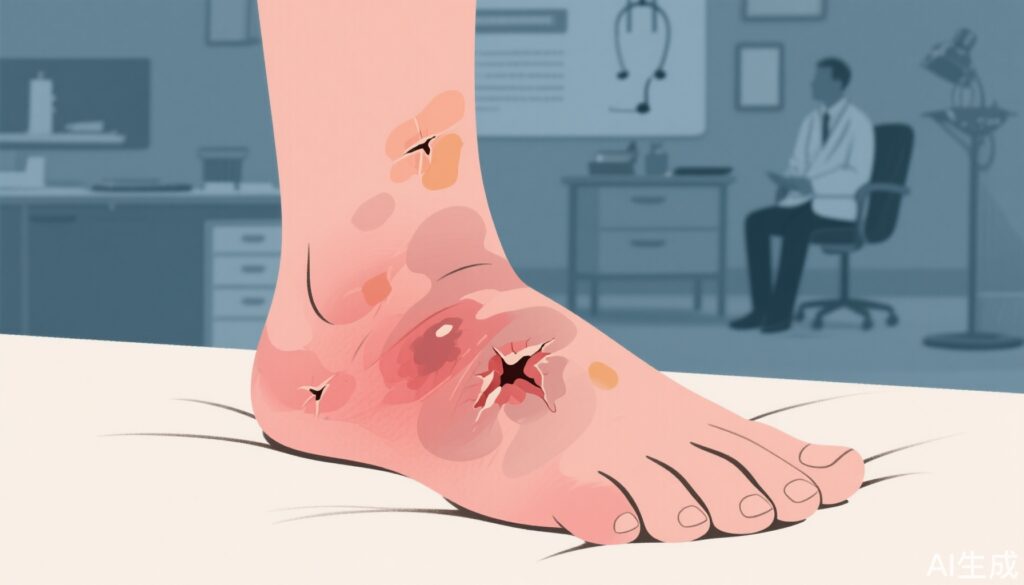Introduction
Feet often reflect overall health. When unusual symptoms arise, they can be early warning signs of serious diseases. Recognizing these signs and seeking timely medical advice can prevent complications.
1. Persistent Numbness in the Feet
Numbness in the feet is common after sitting or standing in one position for too long, usually resolving once you move. However, persistent numbness without an obvious cause, especially if accompanied by tingling or burning sensations, requires attention.
This symptom may relate to neurological conditions such as lumbar disc herniation, where a protruding spinal disc compresses nerve roots causing numbness and pain in the lower limbs, including the feet. Diabetic peripheral neuropathy is another frequent cause; poor long-term blood sugar control damages peripheral nerves, often first affecting the feet symmetrically with numbness and reduced sensation. Additionally, cerebrovascular diseases like stroke may present with abnormal foot sensations before the onset.
2. Unexplained Foot Swelling
Foot swelling can result from prolonged standing or walking, causing physiological edema due to venous return obstruction, which typically resolves with rest. However, persistent swelling without clear cause, especially if accompanied by shiny skin or pitting edema (indentation remaining after pressing), may indicate disease.
Heart failure is a common cause; weakened heart pumping leads to blood pooling in systemic circulation, especially in the feet and lower legs. Kidney dysfunction can also cause swelling due to fluid and waste retention leading to sodium and water buildup. Liver disease and lower limb deep vein thrombosis (DVT) are other potential causes contributing to abnormal foot swelling.
3. Abnormal Changes in Toenails
Healthy toenails are smooth, flat, pinkish, and slightly shiny. Changes such as discoloration, thickening, brittleness, uneven surfaces, longitudinal ridges, or cracks may signal underlying health issues.
A toenail that darkens and gradually enlarges could be a sign of melanoma, a serious form of skin cancer requiring urgent evaluation.
4. Abnormal Foot Temperature
Normally, foot temperature is consistent with body temperature and feels warm. Persistent coldness, even in warm environments, or excessive heat in the feet, can indicate health problems.
Cold feet may be due to poor blood circulation caused by peripheral artery disease, atherosclerosis, or thromboangiitis obliterans, leading to narrowed or blocked lower limb vessels. Symptoms may include coldness, sensitivity to cold, and in severe cases, intermittent claudication (pain while walking). Conversely, persistently hot feet may relate to gout, commonly affecting the big toe joint, characterized by redness, swelling, heat, and intense pain during attacks.
5. Foot Wounds That Are Slow to Heal
Small wounds typically heal within days. If foot wounds persist beyond two weeks without healing, or show signs of infection, ulceration, or pus discharge, prompt medical attention is necessary.
Diabetics are particularly vulnerable due to high blood sugar impairing healing and fostering bacterial growth, increasing infection risk. Severe cases may lead to diabetic foot ulcers, potentially requiring amputation. Lower limb vascular diseases causing poor blood flow also impair wound healing.
When to See a Doctor
If you notice any of these signs—persistent numbness, unexplained swelling, abnormal toenail changes, temperature irregularities, or non-healing wounds—monitor closely and consult a healthcare provider promptly. Early diagnosis and treatment can significantly improve outcomes and prevent complications.
Conclusion
Feet can reveal much about your overall health. Paying attention to changes and responding quickly by seeking medical advice is essential for maintaining health and preventing serious illness. Regular foot care, managing chronic conditions like diabetes, and timely medical evaluations are key to foot and overall well-being.


